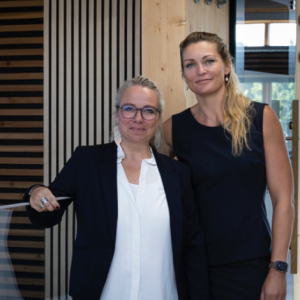Gitte Furdal Damm & Birgitte Johansen

Gitte Furdal Damm, About Human Factors
Birgitte Johansen, About Human Factors
Gitte Furdal Damm has been in aviation for about 20 years, primarily as a pilot but also working as a Flight Crew Supervisor and CRM Trainer. Gitte is today solely teaching Human Factors, and has just completed the master program at Lund University in Human Factors and System Safety with a thesis about resilience in aviation.
Birgitte Johansen has been in the aviation industry for nearly 20 years; initially piloting turboprop aircraft around Africa, and recently as an airline pilot in Scandinavia. She has served as a Safety Manager, and has for many years been involved in line training of new captains and first officers. She has extensive experience in various operations and very diverse cultural environments. Birgitte is attending the aviation bachelor program at Lund University. She has furthermore attended as speaker on several podcasts and online events, and as lecturer for flying schools.
Does CRM Need an Update?
Mandatory Crew Resource Management training has been applicable in aviation training since the early 1990’s. And although CRM has gone through different generations of evolvement, the core methodology of CRM has not changed much since the early 1980’s definitions like:
“CRM is a management system that makes optimum use of all available resources – equipment, procedures and people – in order to promote safety and enhance the efficiency of flight operation” (Lauber, 1984).
This methodology reveals a certain perspective, where the human operator becomes the focus of attention, and CRM training is used as a remedy to change the behaviour of frontline personnel (e.g. be assertive, be resilient, speak up) in an effort to prevent incidents and accidents from happening.
However less attention is made to organisational and regulatory factors influencing the behaviour of the frontline personnel in how work is conducted. Aviation has grown in complexity since the 1980’s and continues to do so, however the same CRM definition is still figuring in the EASA rules
today, supporting a methodology that may not encapsulate the complexity of what it means to work in aviation today.
In the light of this, we may miss vital learning opportunities of what safety is and what it means in everyday work. Inspired by Safety Science we suggest that the human operator makes an enormous contribution to safety, which is left unnoticed as a consequence of an obsolete methodology that leads to an incomplete CRM training design. In an effort to raise the quality of CRM training we suggest that traditional CRM assumptions therefore should be challenged and a broader perspective into the system as a whole should be encouraged, which will allow for better learning opportunities in aviation.
About Human Factors is a Danish company founded in 2016 in an effort to raise the quality of Crew Resource Management in aviation. It has since expanded in the concept with inspiration from Safety Science to incorporate Human Factors in Safety-critical industries. AHF is today run by Gitte Furdal Damm and Birgitte Johansen, based on their many years from the aviation industry merged with studies in Human Factors and System Safety at Lund University. Their effort goes to improving the wellbeing of people working in safety-critical industries, by challenging ‘old’ assumptions and opening up for more honest discussions about how work is done, how it impacts the people involved, and how we can learn and improve the conditions through collaboration.

